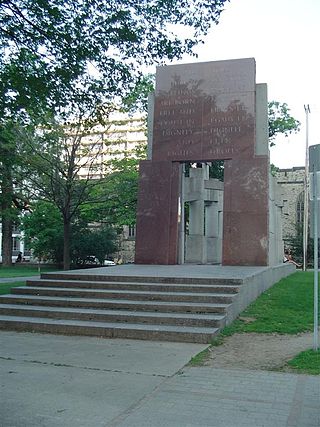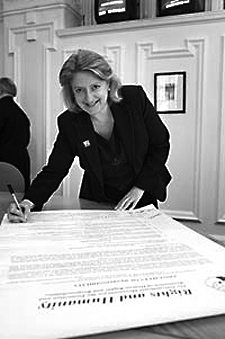
The Universal Declaration of Human Rights (UDHR) is an international document adopted by the United Nations General Assembly that enshrines the rights and freedoms of all human beings. Drafted by a UN committee chaired by Eleanor Roosevelt, it was accepted by the General Assembly as Resolution 217 during its third session on 10 December 1948 at the Palais de Chaillot in Paris, France. Of the 58 members of the United Nations at the time, 48 voted in favour, none against, eight abstained, and two did not vote.

The University for Peace (UPEACE) is an international university and intergovernmental organization. The university was established as a treaty organisation by the United Nations General Assembly in 1980.
John Peters Humphrey was a Canadian legal scholar, jurist, and human rights advocate. He is most famous as the principal author of the first draft of the Universal Declaration of Human Rights.
The Earth Charter is an international declaration of fundamental values and principles considered useful by its supporters for building a just, sustainable, and peaceful global society in the 21st century. Created by a global consultation process, and endorsed by organizations representing millions of people, the Charter "seeks to inspire in all peoples a sense of global interdependence and shared responsibility for the well-being of the human family, the greater community of life, and future generations." It calls upon humanity to help create a global partnership at a critical juncture in history. The Earth Charter's ethical vision proposes that environmental protection, human rights, equitable human development, and peace are interdependent and indivisible. The Charter attempts to provide a new framework for thinking about and addressing these issues. The Earth Charter Initiative organization exists to promote the Charter.
The Universal Declaration of Linguistic Rights is a document signed by the International PEN Club, and several non-governmental organizations in 1996 to support linguistic rights, especially those of endangered languages. The document was adopted at the conclusion of the World Conference on Linguistic Rights held 6–9 June 1996 in Barcelona, Spain. It was also presented to the UNESCO Director General in 1996 but the Declaration has not gained formal approval from UNESCO.

Federico Mayor Zaragoza is a Spanish scientist, scholar, politician, diplomat, and poet. He served as director-general of UNESCO from 1987 to 1999. He is currently the chairman of the Foundation for a Culture of Peace and member of the Honorary Board of the International Decade for the Promotion of a Culture of Peace and Non-Violence for the Children of the World as well as the honorary chairman of the Académie de la Paix.
Peace education is the process of acquiring values, knowledge, attitudes, skills, and behaviors to live in harmony with oneself, others, and the natural environment.
The Vienna Declaration and Programme of Action (VDPA) is a human rights declaration adopted by consensus at the World Conference on Human Rights on 25 June 1993 in Vienna, Austria. The position of United Nations High Commissioner for Human Rights was recommended by this Declaration and subsequently created by General Assembly Resolution 48/141.
Human rights education (HRE) is the learning process that seeks to build up knowledge, values, and proficiency in the rights that each person is entitled to. This education teaches students to examine their own experiences from a point of view that enables them to integrate these concepts into their values, decision-making, and daily situations. According to Amnesty International, HRE is a way to empower people, training them so their skills and behaviors will promote dignity and equality within their communities, societies, and throughout the world.
Founded in 1994, Alternatives, Action and Communication Network for International Development, is a non-governmental, international solidarity organization based in Montreal, Quebec, Canada.

The Canadian Tribute to Human Rights, also known as the Human Rights Monument, is a monumental sculpture located at the corner of Lisgar and Elgin streets in Ottawa, Ontario, Canada. It was designed by Montreal artist and architect Melvin Charney and unveiled by Tenzin Gyatso, the fourteenth Dalai Lama, on September 30, 1990.
James Gurnett is a former politician from Alberta, Canada. He served as a member of the Legislative Assembly of Alberta from 1985 until 1986. He is currently the principal of Common Place Services, doing a variety of consulting work, primarily with NGOs.

Rights and Humanity was founded by Professor Julia Häusermann MBE in 1986. Established as an international not-for-profit association under Swiss law, Rights and Humanity is multi-faith and multi-cultural by philosophy, composition and action. Its premise is that international human rights law and the principles of humanity—the values shared across faiths and cultures—together provide a legal framework and moral compass for global action for progress. Its approach is stated to be holistic and cooperative, seeking progress rather than laying blame, with an ethic of cooperation. In 2003, the association's patrons and some global leaders signed 'The Rights and Humanity Principles of Responsibility'.
The UNESCO/Bilbao Prize for the Promotion of a Culture of Human Rights, created in 1978 as the UNESCO Prize for Human Rights Education to mark the 30th anniversary of the adoption of the Universal Declaration of Human Rights, serves to honour the efforts of organizations or individuals that have made an exemplary contribution to the advancement of knowledge on human rights and building a universal culture of human rights. It was renamed on 5 May 2008 under the terms of a memorandum of understanding with Mayor of Bilbao Iñaki Azkuna whereby the municipality of Bilbao agreed to fund the prize for a period of three years.

The Elders is an international non-governmental organisation of public figures noted as senior statesmen, peace activists and human rights advocates, who were brought together by Nelson Mandela in 2007. They describe themselves as "independent global leaders working together for peace and human rights". The goal Mandela set for The Elders was to use their "almost 1,000 years of collective experience" to work on solutions for seemingly insurmountable problems such as climate change, HIV/AIDS, and poverty, as well as to "use their political independence to help resolve some of the world's most intractable conflicts".

Dennis Edney is a Canadian defence lawyer based in Edmonton, Alberta, Canada. Originally from Dundee, Scotland, he is noted for his involvement in high-profile cases, including Brian Mills, R. v. Trang, as defence attorney for Abdullah and Omar Khadr, who were captured in the War on Terror, for Fahim Ahmad, and for representing the entire Khadr family. He also represented Canadian Abdulrahman El Bahnasawy charged in the US with plotting to carry out mass shootings of civilians at concerts, to bomb New York Times Square, and to bomb the city's subway system.
The Beijing Declaration was a resolution adopted by the UN at the end of the Fourth World Conference on Women on 15 September 1995. The resolution adopted to promulgate a set of principles concerning the equality of men and women.
KAIROS: Canadian Ecumenical Justice Initiatives is a Canadian faith-based ecumenical organization with an aim to effect social change through advocacy, education and research programs in: indigenous rights, ecological justice, women of courage, and migrant justice. These programs are informed by, and networked with, approximately 21 partner organisations in Africa, Asia, Latin America, and the Middle East; about eighty local grassroots groups across Canada; as well as other organizations, churches and individuals.

The Universal Day of Culture under the Banner of Peace, known also as the World Day of Culture, is an observance held annually on April 15 in many countries around the World to promote the protection of culture, the Roerich Pact and the Banner of Peace.
The Declaration and Programme of Action on a Culture of Peace was adopted by the United Nations General Assembly on September 13, 1999. This occurred after ten months of negotiations in the context of preparations for the International Year for the Culture of Peace.







